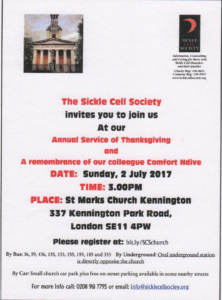By Iyamide Thomas – I wonder how many readers know that there is a World Sickle Cell Day and that this is commemorated each year on 19thJune.

I have deliberately not used the word ‘celebrate’ as some might think “Why should we ‘celebrate’ sickle cell, a debilitating inherited blood condition that can cause severe pain, anaemia and organ damage that affects millions of people around the world”? Sickle cell affects mainly people who originate from Africa, the Caribbean, Middle East, India and the Mediterranean although it can also be found in White people. This is because the sickle cell gene is thought to have come about as nature’s way of protecting against malaria so that people who carried one copy of the gene and are known as ‘carriers’ or having the ‘trait’ had some protection against malaria. Whether we choose to ‘commemorate’ or ‘celebrate’ World Sickle Cell Day one thing is clear – it is a day when much needed awareness -raising of this condition goes on around the world! This came about when in December 2008 the United Nations passed a resolution calling for all its member states and organisations to raise awareness of sickle cell on June 19th each year at the national and international level, thus declaring this day as ‘World Sickle Cell Day’. The UN resolution also urged member states, member agencies, international institutions and development partners to recognise sickle cell as a major health problem and support health systems to provide access to care and the management of sickle cell.
Here at the Sickle Cell Society we will be doing our bit for World Sickle Cell Day by continuing to raise awareness of sickle cell through events, radio interviews, talks and social media. We will also be hosting an online auction to raise funds for our charity which is constantly working to support the sickle cell community by providing information, training, advocacy, education, respite, fun activities for adults and children and more. This year, World Sickle Cell Day coincides with National Blood Week, a week for encouraging people to donate blood. Blood transfusion is a crucial aspect of sickle cell treatment, and the Society adds its voice to the call for more Black blood donors.
This is what John James our Chief Executive of the Sickle Cell Society had to say: “We are excited to see that each year World Sickle Cell Day grows in prominence. Awareness of sickle cell disorder means that people born with it receive better medical treatment and greater understanding. If you don’t know if you’re a carrier of sickle cell disorder, please get tested: it’s a simple, free blood test that can be done at your GP surgery. To help people living with sickle cell disorder, donate blood. It can be a life-saver.”
This is what Linda Chic an individual with sickle cell recently had to say: “Living with sickle cell is not easy, however the strength gained from the constant changes due to its intermittent nature is second to none. We are flexible and have the ability to adapt to whatever life throws at us. However this does not mean that we do not need the support of our friends and family. Often people feel that just because they know of a person with sickle cell, they know everything about the condition. However every person‘s condition differs, so educate yourself on sickle cell and how to provide them with the best support for them as an individual. Do this in order to help them live the best possible life for themselves and most importantly achieve all their heart’s desires”.
For more information about sickle cell and forthcoming Sickle Cell Society events go to:www.sicklecellsociety.org











